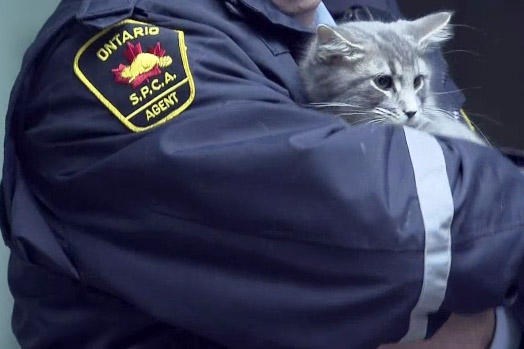The Ontario Society for the Prevention of Cruelty to Animals (OSPCA) has officially handed its animal cruelty enforcement work over to the provincial government and police. The charitable organization claims it’s better this way.
In fact, the OSPCA has shifted its enforcement resources and efforts into more prevention-focused initiatives such as humane education, mobile wellness clinics, and emergency help.
Until recently, the OSPCA had a $5.75 million annual contract with the provincial government to enforce Ontario’s laws against animal cruelty, but according to one OSPCA spokesperson, that work has been coming to a close for a couple years.
“This decision was made for a variety of different reasons,” said Alison Cross, senior director of marketing and communications for the OSPCA. “We believe the enforcement services should fall under the role of the government.”
One of the deciding factors was a supreme court ruling in January stating it was unconstitutional to have a charity responsible for overseeing the enforcement of government laws.
But as far back as 2016, a report written by Dr. Kendra Coulter, a Canadian labour studies scholar and associate professor at Brock University, identified safety concerns for OSPCA enforcement officers.
“Animal cruelty is a crime, and it needs to be addressed no differently than any other crime,” said Cross.
From March to June 28, the OSPCA had been working with the government and police to transition all enforcement work out of the OSPCA mandate and into the hands of the government.
The OSPCA will instead be playing a supportive role to provide care and resources related to the animal.
“It’s actually been fairly great,” said Cross. “It’s been a great collaborative effort, and we’re excited to continue the partnership moving forward.”
For example, Cross said there was one situation in Ottawa where social media posts appeared to show dog abuse. The police took the lead on the case, and asked the OSPCA to care for the animal involved.
The OSPCA also provided forensic evidence through veterinary care to help determine whether or not there was evidence to support animal cruelty under the province’s legislation.
Police laid charges in that case.
“Under the law, animals are considered property and we have to look at them as evidence,” said Cross. “Providing that consultation and support is now what our role will be.”
Cross said the OSPCA received approximately 23,000 calls per year reporting animal cruelty, and of those, about 150 made it to the courts.
In some cases, the caller didn’t understand what was and wasn’t animal cruelty under the legislation, and in other cases, dealing with the report meant OSPCA staff were delivering humane education to the pet owner or providing them with information and resources for their pet’s care including how to access low-cost spay/neuter clinics.
Cross said there may be a dog with a skin condition that scratches a lot, and its appearance could be shocking. The OSPCA officers would educate the owner and provide them with information on where to get help.
Under the new enforcement model, there is a 24/7 hotline for reporting animal cruelty at 1-833-9-ANIMAL. The OSPCA will still be monitoring the 310-SPCA hotline and will be able to redirect animal cruelty complaints to the appropriate enforcement body.
“We’re still very much in the community,” said Cross.
She said now that they aren’t required to commit resources to enforcement, the OSPCA hopes to expand its rescue programs.
Those who were trained as enforcement officers in some cases have moved on to continue that work with the government, and in other cases, they will stay at the OSPCA to help with rescue, education, and animal advocacy work.
“They are highly-trained, and their resources are needed,” said Cross.
According to her, the OSPCA will be exploring ways of offering emergency boarding in situations where someone is fleeing a domestic violence situation and needs to stay in a shelter for a while, but cannot bring their pets with them.
There will also be work by the OSPCA to offer emergency help to animals in communities experiencing natural disasters.
One more area Cross said the OSPCA is exploring is a Pets for Life program that offers veterinary services to communities and areas that are under-serviced or where people may not be able to afford veterinary care.
At the Barrie Animal Centre (91 Patterson Rd.), which is an affiliate of the OSPCA, much of the those planned prevention efforts are already in place.
For more information, visit their website.



